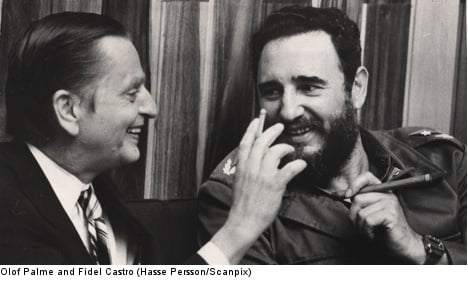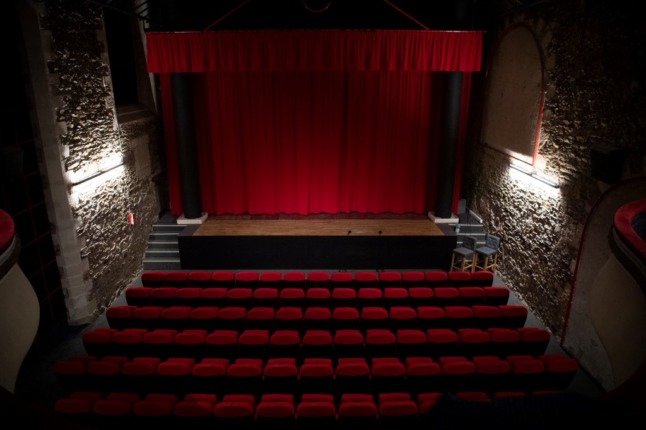For the last few weeks, buzz has been building in Sweden for the September 14th release of “Palme: älskad och hatad” (‘Palme: loved and hated’).
The feature-length documentary is the first to feature material provided by Palme’s family, including never-before-seen Super-8 clips from family vacations and attempts to trace the journey of an upper-class boy who went on to “create the world’s most equal country”.
Despite more than 25 years having passed since he was assassinated in downtown Stockholm, Palme remains a divisive figure in Swedish politics.
His name can still spark strong reactions about how he either helped or hurt Sweden during his three decades at the heart of Swedish politics, including two stints as prime minister.
According to filmmaker Maud Nycander, Palme was – and still is – a one-of-a-kind political figure in Sweden whose intensity and passion stood in stark contrast to the way Swedish politics had been conducted.
“Sweden is a consensus country, and here comes a politician with brilliant oratory skills giving fiery speeches. That was something new for Sweden,” she tells The Local.
Related Olof Palme photo gallery
“That led to him being viewed as arrogant and a know-it-all very early on, even when he was simply a political advisor [to then Prime Minister Tage Elander] in the late 1950s when the first hateful newspaper articles appeared.”
Fellow filmmaker Kristina Lindström adds that Palme’s combative debate style was often viewed as “aggressive”.
“But that’s not the way he really was. He had a hard time understanding why people couldn’t differentiate between how he conducted a debate and how he was as a person,” she says.
Lindström tells of a recent review of the film in a Swedish hip-hop magazine which compared Palme to Swedish football star Zlatan Ibrahimovic proclaiming, “if you like Zlatan, you should like Palme”.
“It’s sort of like a metaphor for someone who is outgoing, who sparks reactions – both for and against; who says what they think,” she says.
“When we grew up, Palme was more of a concept than a person. And everyone had an opinion about him. He was uncompromising. When he took a position, he was very clear about it and very passionate like no one else was.”
Nycander and Lindström explain that their motivation for making the film was to help lift Palme’s political legacy out from under the shadow of his 1986 assassination.
“The murder really overshadowed Palme as a person and his life,” explains Nycander.
“The generation of people who are now around 30 haven’t grown up with Palme like we did; they only know about Palme through the murder.”
In addition to offering younger Swedes a more nuanced view of Palme’s time as the leader of the Social Democratic party, the film is also very much about Sweden at the time.
“Our vision was to do a film that could tell about both Palme and his time. The film shows a lot about the Sweden that existed at that time and he was a part of that time. He had an impact on the times, and the times had an impact on him,” says Nycander.
“There was such a belief in the future on the part of Palme and at that time that we don’t have today.”
Both filmmakers emphasize that the film in no way attempts to put Palme on a pedestal or portray him in an overly positive light.
Indeed, the film also addresses a number of the scandals which Palme faced during his career, including the IB-affair, in which a secret intelligence agency was revealed to be operating with the Armed Forces.
“We really haven’t tried to paint some sort of idealized portrait; rather we wanted to do a film about a very complex person,” says Nycander.
Indeed, Palme’s legacy is a complicated one, his still-unsolved assassination notwithstanding.
As an example, the filmmakers reflect on Palme’s relationship with the United States, the foreign policy of which Palme was often at loggerheads, but a country which nevertheless held a warm spot in his heart.
It was during a year studying at Kenyon College in Ohio that Palme was able to move beyond what had been a number of turbulent years at boarding school in Sweden.
“In the United States he got to be a new person, a different person,” explains Lindström.
“He really was a friend of the United States; he loved the spirit there and the energy.”
Nevertheless, the image of Palme famously marching in Stockholm with the ambassador from North Vietnam in 1968 prompted the United States to recall its ambassador in what many consider to be the nadir of relations between the two countries.
In the film, former US Secretary of State Henry Kissinger discusses his frustration at Sweden’s lack of understanding for the United States’ policy in Vietnam.
“To be compared with Nazism despite having fought a four-year war against it was unacceptable,” Kissinger says in the film.
But despite differences over policy, Kissinger maintained a great respect for Palme, delivering one of the more moving speeches at his funeral, Nycander recalls.
While the film doesn’t focus on Palme’s assassination, Nycander believes that the Sweden portrayed in the film ceased to exist the day that Palme died.
“We had a vision of ourselves as a country that was a little better than others. We were free, forward looking, modern. You could trust us,” she explains.
“We had an image of ourselves that everything was so great, but maybe in reality it wasn’t.”
Palme also played an important part in shaping the view of Sweden from abroad.
“Palme still represents Sweden in many parts of the world even though Sweden is no longer his country,” says Lindström.
“He helped put Sweden on the map.”
David Landes



 Please whitelist us to continue reading.
Please whitelist us to continue reading.
Member comments